广州深圳新牛津版教材七年级下册Unit 2知识点小结
Unit2知识点和考点2022-2023学年牛津译林版七年级英语下册
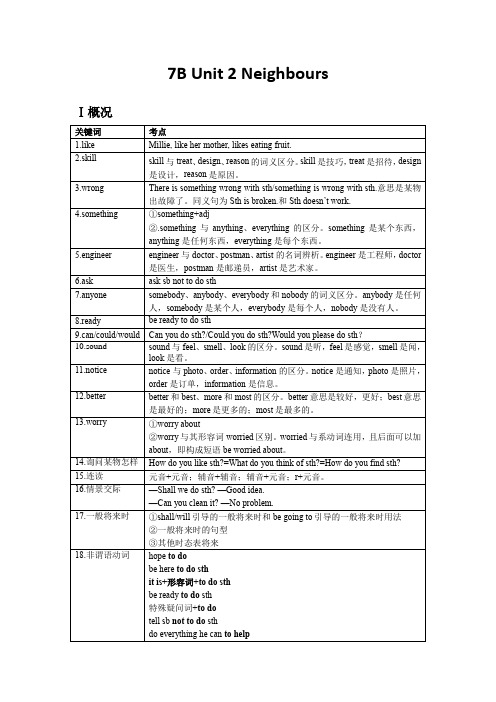
4.There is something wrong with my computer.
(1)something的基本含义做不定代词,意思是某个东西,某件事。
(2)something的核心考点之一考察不定代词与形容词的位置关系。当形容词修饰不定代词时,形容词置于不定代词后面。比如anythinginteresting
11.notice
notice与photo、order、information的区分。notice是通知,photo是照片,order是订单,information是信息。
12.better
better和best、more和most的区分。better意思是较好,更好;best意思是最好的;more是更多的;most是最多的。
【2022年无锡】lie,her mother,eating fruit.
A.likes; likeB.like; likesC.like; like D.likes; likes
答案B
2.They often meet at the community center and share their different skills.
—I don’t mind. ________—whatever you have got.
A.NothingB.AnythingC.SomethingD.Everything
答案B
【2022年南外】5.Next weekend, Uncle John plans to do ________, only stay at home to have a rest.
A. to stay upB. don’t stay upC. doesn’t stay upD. not to stay up
广州牛津新教材七年级初一下unit2重点语法
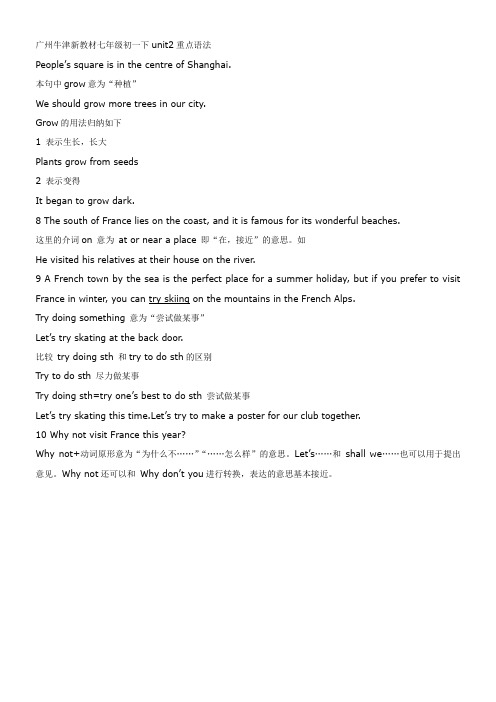
广州牛津新教材七年级初一下unit2重点语法People’s square is in the centre of Shanghai.本句中grow意为“种植”We should grow more trees in our city.Grow的用法归纳如下1 表示生长,长大Plants grow from seeds2 表示变得It began to grow dark.8 The south of France lies on the coast, and it is famous for its wonderful beaches.这里的介词on 意为at or near a place 即“在,接近”的意思。
如He visited his relatives at their house on the river.9 A French town by the sea is the perfect place for a summer holiday, but if you prefer to visit France in winter, you can try skiing on the mountains in the French Alps.Try doing something 意为“尝试做某事”Let’s try skating at the back door.比较try doing sth 和try to do sth的区别Try to do sth 尽力做某事Try doing sth=try one’s best to do sth 尝试做某事Let’s try skating this time.Let’s try to make a poster for our club together.10 Why not visit France this year?Why not+动词原形意为“为什么不……”“……怎么样”的意思。
牛津深圳版七年级下册英语知识点总结全册含习题和答案
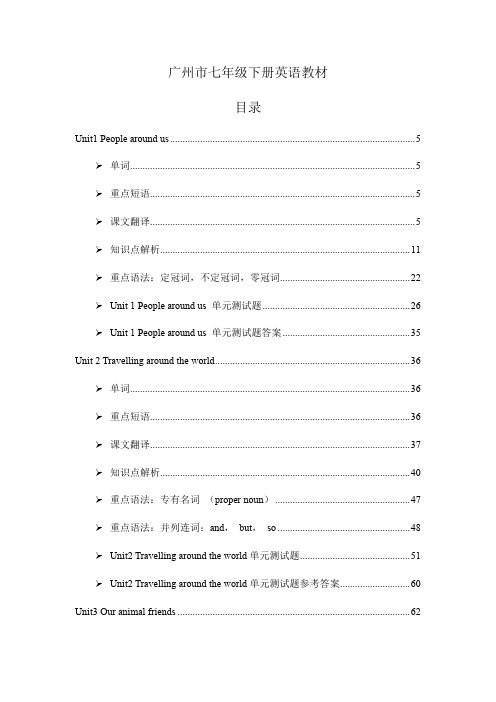
广州市七年级下册英语教材目录Unit1 People around us (5)➢单词 (5)➢重点短语 (5)➢课文翻译 (5)➢知识点解析 (11)➢重点语法:定冠词,不定冠词,零冠词 (22)➢Unit 1 People around us 单元测试题 (26)➢Unit 1 People around us 单元测试题答案 (35)Unit 2 Travelling around the world (36)➢单词 (36)➢重点短语 (36)➢课文翻译 (37)➢知识点解析 (40)➢重点语法:专有名词(proper noun) (47)➢重点语法:并列连词:and,but,so (48)➢Unit2 Travelling around the world单元测试题 (51)➢Unit2 Travelling around the world单元测试题参考答案 (60)Unit3 Our animal friends (62)➢重点短语 (62)➢课文翻译 (62)➢知识点解析 (64)➢重点语法Reflexive pronouns反身代词 (72)➢重点语法Prepositions of position方位介词 (74)➢Unit 3 Our animal friends单元测试题 (77)➢Unit 3 Our animal friends单元测试题参考答案 (82)Unit4 Save the trees (84)➢单词 (84)➢重点短语 (84)➢课文翻译 (84)➢知识点解析 (86)➢重点语法:现在进行时态 (94)➢Unit 4 Save the trees单元测试题 (99)➢Unit 4 Save the trees单元测试题参考答案 (108)Unit5 Water (111)➢单词 (111)➢重点短语 (111)➢课文翻译 (112)➢单词变形 (114)➢重点语法辨析:a little , little , a few , few,many,much (119)➢Unit5 Water单元测试题 (122)➢Unit5 Water单元测试题答案 (129)Unit6 Electricity (131)➢单词 (131)➢重点短语 (131)➢课文翻译 (131)➢单词变形 (133)➢知识点解析 (134)➢重点语法:情态动词 (138)➢Unit 6 Electricity测试题 (142)➢Unit 6 Electricity测试题参考答案 (149)Unit7 Poems (152)➢单词 (152)➢重点短语 (152)➢单词变形 (153)➢知识点解析 (154)➢重点语法:祈使句(Imperatives) (160)➢重点语法:What/How引导的感叹句(Exclamations) (164)➢Unit 7 Poems 综合测试题 (167)Unit8 From hobby to career (177)➢单词 (177)➢重点短语 (177)➢单词变形 (177)➢知识点解析 (178)➢重点语法一:when引导的时间状语从句 (181)➢重点语法二:uesd to/ did not used to (184)➢Unit 8 From hobby to career测试卷 (186)➢Unit 8 From hobby to career测试卷参考答案 (194)Unit1 People around us ➢单词➢重点短语➢课文翻译Unit1 Reading (书本P3)My grandma我的奶奶My grandma was a short woman with grey hair.我的奶奶是个头发灰白的矮个子女人。
牛津深圳版七年级下册Unit2 知识要点总结
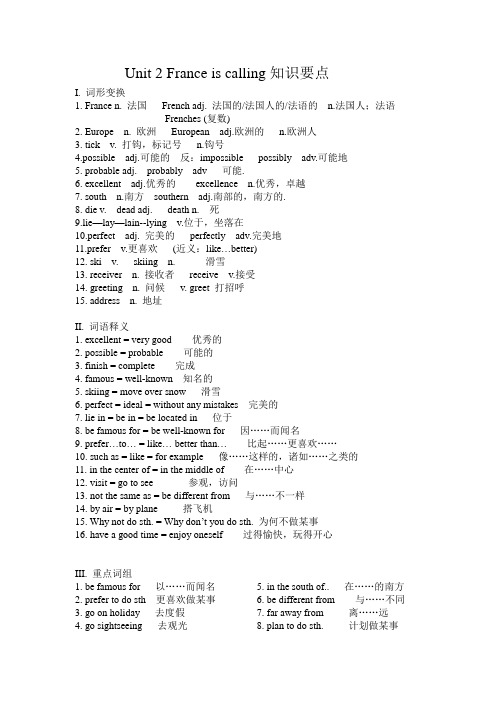
Unit 2 France is calling知识要点I. 词形变换1. France n. 法国French adj. 法国的/法国人的/法语的n.法国人;法语Frenches (复数)2. Europe n. 欧洲European adj.欧洲的n.欧洲人3. tick v. 打钩,标记号n.钩号4.possible adj.可能的反:impossible possibly adv.可能地5. probable adj. probably adv 可能.6. excellent adj.优秀的excellence n.优秀,卓越7. south n.南方southern adj.南部的,南方的.8. die v. dead adj. death n. 死9.lie—lay—lain--lying v.位于,坐落在10.perfect adj. 完美的perfectly adv.完美地11.prefer v.更喜欢(近义:like…better)12. ski v. skiing n. 滑雪13. receiver n. 接收者receive v.接受14. greeting n. 问候v. greet 打招呼15. address n. 地址II. 词语释义1. excellent = very good 优秀的2. possible = probable 可能的3. finish = complete 完成4. famous = well-known 知名的5. skiing = move over snow 滑雪6. perfect = ideal = without any mistakes 完美的7. lie in = be in = be located in 位于8. be famous for = be well-known for 因……而闻名9. prefer…to… = like… better than…比起……更喜欢……10. such as = like = for example 像……这样的,诸如……之类的11. in the center of = in the middle of 在……中心12. visit = go to see 参观,访问13. not the same as = be different from 与……不一样14. by air = by plane 搭飞机15. Why not do sth. = Why don’t you do sth. 为何不做某事16. have a good time = enjoy oneself 过得愉快,玩得开心III. 重点词组1. be famous for 以……而闻名2. prefer to do sth 更喜欢做某事3. go on holiday 去度假4. go sightseeing 去观光5. in the south of.. 在……的南方6. be different from 与……不同7. far away from 离……远8. plan to do sth. 计划做某事9. have a wonderful time玩得很开心10. the capital of ……的首都11. at least 至少12. not only … bus also …不仅……而且……15. be known as 作为……而16. take a lift 坐电梯17. department store 百货商店18. walk up 走上前19. go down the stairs 走下楼梯20. be interested in 对……感兴趣21. on the coast 在海滨22. by the sea 在海边23. lie(be) on/in 位于24. take the lift 乘电梯25. make wine 制作红酒26.try to do sth. 努力做某事27.try doing sth. 尝试做某事13. learn about 了解28. be close to 对……不开放14 . in the future 在将来IV. 写作常用句型1. Shenzhen lies in the south of China.深圳位于中国南部。
(完整版)广州深圳新牛津版教材七年级下册Unit2知识点小结
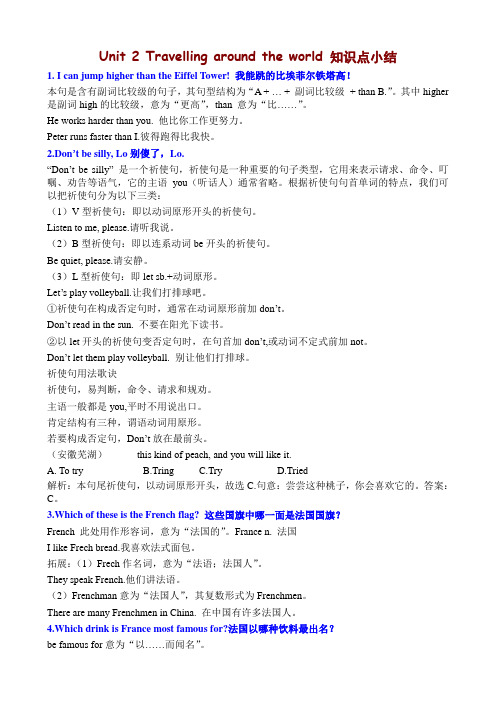
Unit 2 Travelling around the world 知识点小结1. I can jump higher than the Eiffel Tower! 我能跳的比埃菲尔铁塔高!本句是含有副词比较级的句子,其句型结构为“A + … + 副词比较级+ than B.”。
其中higher 是副词high的比较级,意为“更高”,than 意为“比……”。
He works harder than you. 他比你工作更努力。
Peter runs faster than I.彼得跑得比我快。
2.Don’t be silly, Lo别傻了,Lo.“Don’t be silly”是一个祈使句,祈使句是一种重要的句子类型,它用来表示请求、命令、叮嘱、劝告等语气,它的主语you(听话人)通常省略。
根据祈使句句首单词的特点,我们可以把祈使句分为以下三类:(1)V型祈使句:即以动词原形开头的祈使句。
Listen to me, please.请听我说。
(2)B型祈使句:即以连系动词be开头的祈使句。
Be quiet, please.请安静。
(3)L型祈使句:即let sb.+动词原形。
Let’s play volleyball.让我们打排球吧。
①祈使句在构成否定句时,通常在动词原形前加don’t。
Don’t read in the sun. 不要在阳光下读书。
②以let开头的祈使句变否定句时,在句首加don’t,或动词不定式前加not。
Don’t let them play volleyball. 别让他们打排球。
祈使句用法歌诀祈使句,易判断,命令、请求和规劝。
主语一般都是you,平时不用说出口。
肯定结构有三种,谓语动词用原形。
若要构成否定句,Don’t放在最前头。
(安徽芜湖)______this kind of peach, and you will like it.A. To tryB.TringC.TryD.Tried解析:本句尾祈使句,以动词原形开头,故选C.句意:尝尝这种桃子,你会喜欢它的。
深圳牛津版七年级下册知识点总结

深圳牛津版七年级下册课文知识点复习总结Unit1~8期末总复习Unit1 People around usKey phrases1. hard-working adj.“勤勉的,努力工作的”作定语work hard动副结构短语2. be patient with sb.“对某人有耐心“3. take (one’s) time to do sth.“花费时间做某事”It takes sb. some time to do sth. =sb. spend some time on sth./(in) doing sth.“做某事需花费⋯⋯时间”4.like doing sth. “喜欢做某事”(表喜欢、爱好某种经常的或习惯性的活动)like to do sth.“喜欢去做”(表喜欢、爱好某种特定的或具体的活动)Eg. I like visiting friends on Sundays and I like to visit Tom this Sunday.like sb. to do sth. “喜欢某人做某事”Eg. We all like him to play the guitarlike介词Eg. She looks like her father.5. with同,与,和talk with a friend用(工具、手段)cut meat with a knife在⋯⋯身边(随身携带)Do you have any money with you?Take an umbrella with you?以⋯⋯,带着⋯⋯She often talks with smile.6.always 频率副词“总是” be 动词或助动词之后,行为动词之前Eg. Our teacher is always kind to us.“一直;(将)永远;老是(用于进行时)”Eg. I will always remember your words.She is always moving things around.He has always been the tutor.always>usually>often7.probably adv.“大概;很可能”adj.“可能的,大概”Eg.I ’ll probably be a doctor in the future.It is probable to finish the job before dark.8.in the world世界上all over the world = throughout the world全世界9.never adv.是 ever的否定形式,用于加强否定语气。
牛津译林英语七年级英语下册unit2neighbours知识点归纳

一、知识要点1.Where are you going?你打算去哪里?be going此处为“现在进行时表将来”。
现在进行时表将来主要用于表示按计划或安排将要发生的动作,常有“意图”“安排”或“打算”的含义。
这种现在进行时比较生动,给人一种期待感。
go, come, leave等表示位移的动词,都可以用于现在进行时表将来。
例如:He is going. 他要走了。
I’m coming. 我要来了。
Tom is leaving. 汤姆要走了。
2. I’m going to vi sit our new neighbours.我打算拜访我们的新邻居。
be going to意为“计划,打算”,后接动词原形,用于表将来。
例如:I’m going to wash the car if I have time. 若有时间我想洗洗车。
Where are we going to stay tonight? 我们今晚住哪里?3. I’m afraid they won’t welcome visitors like you.恐怕他们不会欢迎像你一样的拜访者。
(1)welcome作及物动词,意为“欢迎’’,可与介‘词to连用;也可作形容词,意为“受欢迎的"。
如:Welcome you to our school! 欢迎到我们学校来!You’re welcome.不用谢。
(2)句中like是介词,意为“像,相似’’,其反义词是unlike;作动词时,意为“喜欢’’,后可接动名词或不定式作宾语。
如:What is Jim like? 吉姆这个人怎么样?They like playing football on Sunday.他们喜欢在星期天踢足球。
(3)won’t是will与not的缩略形式。
“will+动词原形"也是一般将来时的构成之一。
如:We will take a bus to work.我们将乘公共汽车上班。
2020年牛津深圳版英语七年级下册Unit2 知识点总结讲解课件(共56张)

3. Speaking
/tʃ/
beach
change
French
watch
/dʒ/
January
job
jump
orange
/tʃ/清辅音 /dʒ/浊辅音,喉咙震动
/ts/
bites
cats
lifts
sites
/dz/
fields
goods
guides
rides
/ts/清辅音 /dz/浊辅音,喉咙震动
I have a lot of friends, for example, Lily is my friend.
such as“比如”,位于句中,后面常接名词、v.-ing等词。 用来例举事例。 for example “例如”,可位于句首、句中或句末,后面常 接一个句子,并用逗号隔开。用来详细描述事例.
• try doing sth “尝试做某事” • try to do sth“尽力做某事” =try one's best to do sth. • 我将尝试学日语 • 他设法尽力提前完成这件工作.
2. Language point
1. It is a country with many beautiful places.
• prefer doing A to doing B “喜欢做A胜于做B” • prefer A to B “更喜欢A” • 我喜欢看电影胜过看书。 • 我喜欢茶胜过咖啡。
• You can try skiing on the mountains in the France Alps. • Please try to finish this work in thirty miniutes.
牛津深圳版《Unit 2 Daily life》单元预习知识点

⑥enjoy doing ⑦different difference-differences ⑧in the morning on Monday morning on a cold morning ⑨best-good try one’s best尽最大努力
⑩end=finish=be over at the end of 在…最后 in the end,最后 end up with 以…结束 ⑪from…to…
6:30 a.m. She always ⑤arrives at school at 7:25 a.m. She usually has two lessons ⑥in the morning. In the afternoon, she has one lesson. ⑦ After school, she ⑧plays volleyball ⑨with her students.
单词学习
11.bell [bel] n.钟,铃 12.ring [rɪŋ] v.(使)发出钟声,响起铃声 13.end[end] v.结束终止 14.band [bænd] n.乐队 15.practice ['præktɪs] n.练习 16.together [tə'geðə] adv.在一起 17.market ['mɑːkɪt] n.集市,市场 18.guitar[ɡɪˈtɑː] n.吉他 19.grade[greɪd] n.年级 20.短语
⑪prepare for 为…做准备 ⑫help sb with sth.
help sb. (to) do sth. with the help of =with one’s help ⑬go to bed=fall asleep=go to sleep
牛津译林版七年级下册英语 Unit2 知识点总结-最新
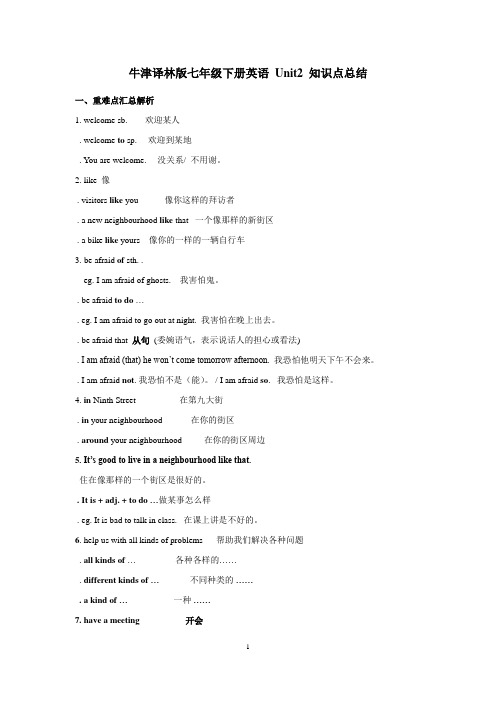
牛津译林版七年级下册英语Unit2 知识点总结一、重难点汇总解析1. welcome sb. 欢迎某人. welcome to sp. 欢迎到某地. You are welcome. 没关系/ 不用谢。
2. like 像. visitors like you 像你这样的拜访者. a new neighbourhood like that 一个像那样的新街区. a bike like yours 像你的一样的一辆自行车3.be afraid of sth. .eg. I am afraid of ghosts. 我害怕鬼。
. be afraid to do…. eg. I am afraid to go out at night. 我害怕在晚上出去。
. be afraid that 从句(委婉语气,表示说话人的担心或看法). I am afraid (that) he won’t come tomorrow afternoon.我恐怕他明天下午不会来。
. I am afraid not. 我恐怕不是(能)。
/ I am afraid so. 我恐怕是这样。
4. in Ninth Street 在第九大街. in your neighbourhood 在你的街区. around your neighbourhood 在你的街区周边5. It’s good to live in a neighbourhood like that.住在像那样的一个街区是很好的。
. It is + adj. + to do …做某事怎么样. eg. It is bad to talk in class. 在课上讲是不好的。
6. help us with all kinds of problems 帮助我们解决各种问题. all kinds of …各种各样的……. different kinds of …不同种类的……. a kind of …一种……7. have a meeting 开会. have a class meeting 开一次班会. have a parents’ meeting 开一次家长会. have a sports meeting 开一次运动会8. There is something wrong with my computer. 我的电脑出了一些毛病。
七年级英语下册Unit2Neighbours知识归纳与拓展新版牛津版
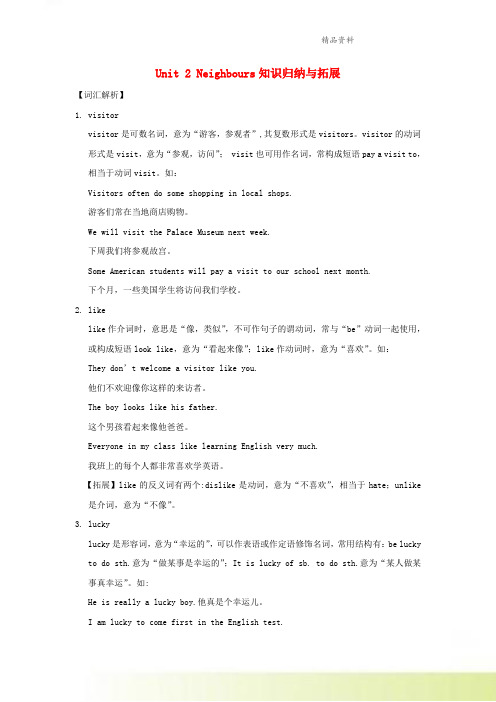
Unit 2 Neighbours知识归纳与拓展【词汇解析】1. visitorvisitor是可数名词,意为“游客,参观者”,其复数形式是visitors。
visitor的动词形式是visit,意为“参观,访问”; visit也可用作名词,常构成短语pay a visit to,相当于动词visit。
如:Visitors often do some shopping in local shops.游客们常在当地商店购物。
We will visit the Palace Museum next week.下周我们将参观故宫。
Some American students will pay a visit to our school next month.下个月,一些美国学生将访问我们学校。
2. likelike作介词时,意思是“像,类似”,不可作句子的谓动词,常与“be”动词一起使用,或构成短语look like,意为“看起来像”;like作动词时,意为“喜欢”。
如:They don’t welcome a visitor like you.他们不欢迎像你这样的来访者。
The boy looks like his father.这个男孩看起来像他爸爸。
Everyone in my class like learning English very much.我班上的每个人都非常喜欢学英语。
【拓展】like的反义词有两个:dislike是动词,意为“不喜欢”,相当于hate;unlike 是介词,意为“不像”。
3. luckylucky是形容词,意为“幸运的”,可以作表语或作定语修饰名词,常用结构有:be lucky to do sth.意为“做某事是幸运的”;It is lucky of sb. to do sth.意为“某人做某事真幸运”。
如:He is really a lucky boy.他真是个幸运儿。
Unit2Reading知识清单-牛津深圳版英语七年级下册
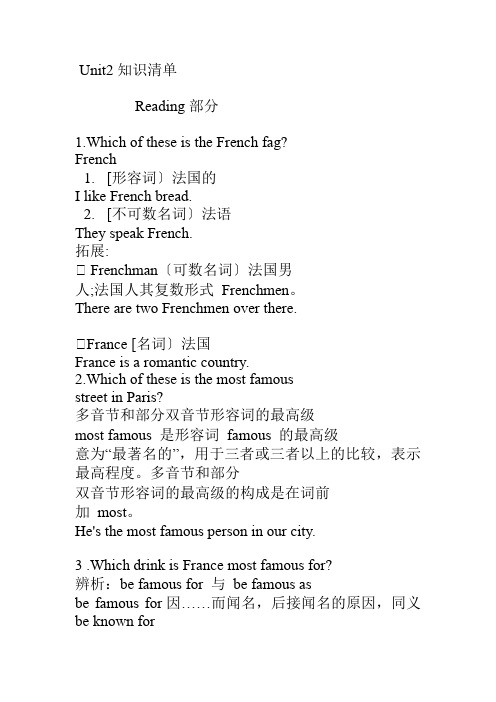
Unit2知识清单Reading部分1.Which of these is the French fag?French1.[形容词〕法国的I like French bread.2.[不可数名词〕法语They speak French.拓展:① Frenchman〔可数名词〕法国男人;法国人其复数形式Frenchmen。
There are two Frenchmen over there.①France [名词〕法国France is a romantic country.2.Which of these is the most famousstreet in Paris?多音节和部分双音节形容词的最高级most famous 是形容词famous 的最高级意为“最著名的”,用于三者或三者以上的比较,表示最高程度。
多音节和部分双音节形容词的最高级的构成是在词前加most。
He's the most famous person in our city.3 .Which drink is France most famous for?辨析:be famous for 与be famous asbe famous for因……而闻名,后接闻名的原因,同义be known forbe famous as 作为.....而闻名,后接表示职位、身份等的词,同义短语是be known asThis place is famous for its green tea.He is famous as a scientist in the world.3.Tick the possible answer(s).possible〔形容词〕可能的强调客观上有可能。
其副词形式possibly(可能地),其反义词是impossible(不可能的)。
I'll help you if possible.Please come as early as possible.It is possibly true.5.France is in Western Europe.Western〔形容词〕西方国家的;(尤指)欧美的;西方的(w 可以小写)由名词West 加后级-ern构成。
牛津译林版七年级英语下册Unit 2 Neighbours 重难点知识归纳总结
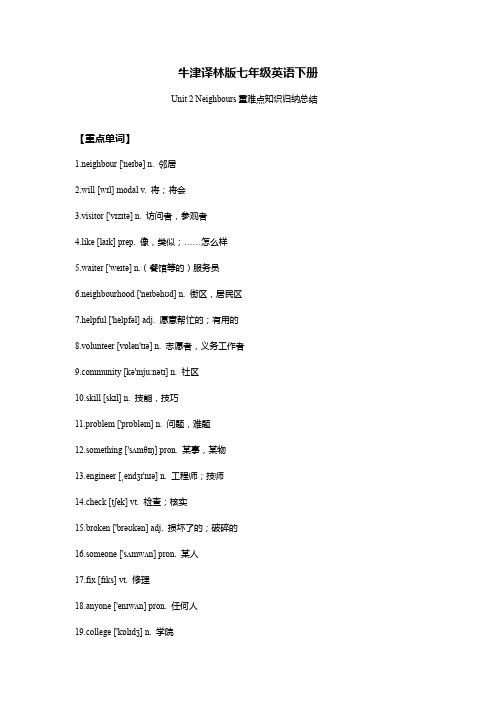
17.on the afternoon of 5 March在三月五号的下午
18.all the day整天
19.know a lot about styles and colours对风格和颜色很了解
20.be happy to give you some ideas很高兴给你一些主意
牛津译林版七年级英语下册
Unit 2 Neighbours重难点知识归纳总结
【重点单词】
1.neighbour ['neɪbə] n.邻居
2.will [wɪl] modal v.将;将会
3.visitor ['vɪzɪtə] n.访问者,参观者
4.like [laɪk] prep.像,类似;……怎么样
【重点句型】
1.I am afraid they won’t welcome visitors like you.
我恐怕他们不会欢迎像你这样的客人。
2.It’s good to live in a neighbourhood like that.
住在那样一个小区很好。
3.What are your neighbours like?
34.artist ['ɑːtɪst] n.艺术家
35.sound [saʊnd] linking v.听起来
36.sick [sɪk] adj.生病的;恶心的
37.notice ['nəʊtɪs] n.布告,通知
rmation [ˌɪnfΒιβλιοθήκη 'meɪʃən] n.信息
39.below [bɪ'ləʊ] adv.下面
5.waiter ['weɪtə] n.(餐馆等的)服务员
新牛津深圳版英语七年级下册第2单元知识要点

新牛津深圳版英语七年级下册第2单元知识要点Unit 2: At School本单元以“At School”为主题,主要介绍了在学校的常见场景和相关词汇、句型以及日常对话。
1. Vocabulary(词汇)本单元的词汇主要涵盖以下方面:- Places at school: classroom(教室)、library(图书馆)、computer room(计算机室)、science lab(实验室)等;- Subjects: math(数学)、English(英语)、Chinese(汉语)、science(科学)等;- School facilities: whiteboard(白板)、computer(计算机)、projector(投影仪)等;- School activities: sing a song(唱歌)、play basketball(打篮球)、do experiments(做实验)等。
2. Sentence Patterns(句型)在本单元中,我们学习了一些常用的句型,用于描述在学校的活动和交流。
- What's your favorite subject?(你最喜欢的科目是什么?)- My favorite subject is...(我的最喜欢的科目是...)- What do you do at school?(你在学校做什么?)- I study English, math, and science.(我学英语、数学和科学。
)- Let's go to the computer room.(让我们去计算机室。
)- What are you doing?(你在做什么?)- I'm playing basketball.(我在打篮球。
)3. Dialogues(对话)本单元的对话主要涵盖了在学校的常见日常交流情景。
Dialogue 1: Talking about favorite subjectsA: What's your favorite subject?B: My favorite subject is English. What about you?A: I like math the most.B: That's interesting.Dialogue 2: Making plansA: What do you do at school?B: I study different subjects. How about you?A: I study English, math, and science. Let's go to the library after class. B: Sure, that sounds like a good idea.4. Culture Corner(文化角落)本单元的文化角落部分主要介绍了英语国家和中国学校文化的一些差异。
Unit2(Places)重点词汇课件2021-2022学年牛津深圳版(广州沈阳通用)英语七年级下册
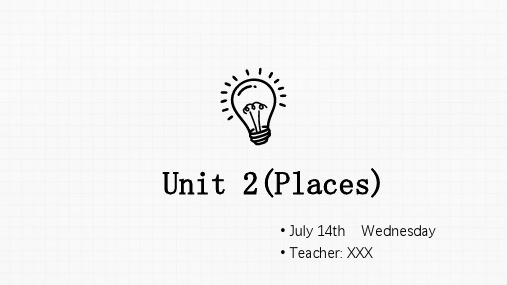
As...as possible 尽可能… eg: My parents give me support as much as possible.
我的父母尽可能多地给我支持。
Europe south
n.欧洲 European adj.欧洲的
n.南方,南部 southern adj. 南面的,南方的 方位词前要加the eg: Have you been to the south of France?
我计划再去游览一次。 4.It is not only beautiful, but also strange.
它不仅美丽,而且怪异。 5.France is very famous for its wine. 法国的葡萄酒非常有名。
ARTICLE
旅行
1. 常用词汇
lie坐落于, in the south/ north..of 在...的...方位 , in the center of在...的中心 , is the capital of... ....的首都 modern 现代的, relaxing 令人轻松的,traditional 传统的,natural 自然的 , be famous for因...而闻名, try doing sth 尝试做某事 , tasty 美味的, on another day 在另一天, different kinds of......不同种类的.... , on the trip to....在去....的途中
Unit 2(Places)
• July 14th Wednesday • Teacher: XXX
France
n.法国
French Frenchmen
adj. 法国的 n.法语
七年级英语下册 Unit 2 Neighbours知识点精讲(上)(新版)牛津版
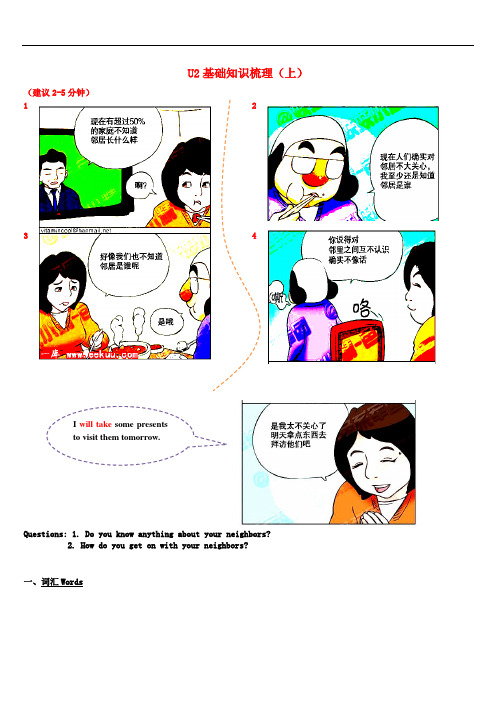
U2基础知识梳理(上)(建议2-5分钟) 1 23 4Questions: 1. Do you know anything about your neighbors?2. How do you get on with your neighbors?一、词汇WordsI will take some presentsto visit them tomorrow.1.___________ 邻居(英式英语)neighbor为美式英语neighbor用作名词,意为“邻居”,指居住在同一座楼、同一小区、同一街区的人数其复数形式是___________.2.like 像,相似,类似(1)like用作介词,指某人或某物“像,相似,类似”。
常用的固定搭配有像…样子______________________;看起来像______________________;例1:我不欢迎像你这样的人。
____________________________________________例2:这个女孩看起来像她的父亲。
____________________________________________(2) like 也可以用作动词,表示“喜欢”之意,常用的固定搭配:like sb/sth 喜欢某人/某物_______________ 喜欢做某事(习惯)_______________ 喜欢做某事(具体的事)练习:1. He_______ his father because he wants to speak English______ his father.A. like; likeB. likes; likesC. likes; likeD. like; likes2. I need a bike_________.A. like youB. like yourC. like yoursD. likes you3. John, ______ his father, _______ playing basketball.A. likes; likeB. like; likesC. likes; likesD. like; like4. Do you like any sports like_______, _______ or________?A. swimming; playing basketball; runB. swimming;playing basketball; runningC. swim;play basketball; runD. to swim; to play basketball; to run3.waiter (参观等)服务员名词,意为“(餐馆等)服务员”,是由动词wait 加后缀-er构成的,其对应词为___________,意为“女侍者,女服务员”。
- 1、下载文档前请自行甄别文档内容的完整性,平台不提供额外的编辑、内容补充、找答案等附加服务。
- 2、"仅部分预览"的文档,不可在线预览部分如存在完整性等问题,可反馈申请退款(可完整预览的文档不适用该条件!)。
- 3、如文档侵犯您的权益,请联系客服反馈,我们会尽快为您处理(人工客服工作时间:9:00-18:30)。
Unit 2 Travelling around the world 知识点小结1. I can jump higher than the Eiffel Tower! 我能跳的比埃菲尔铁塔高!本句是含有副词比较级的句子,其句型结构为“A + … + 副词比较级+ than B.”。
其中higher 是副词high的比较级,意为“更高”,than 意为“比……”。
He works harder than you. 他比你工作更努力。
Peter runs faster than I.彼得跑得比我快。
2.Don’t be silly, Lo别傻了,Lo.“Don’t be silly”是一个祈使句,祈使句是一种重要的句子类型,它用来表示请求、命令、叮嘱、劝告等语气,它的主语you(听话人)通常省略。
根据祈使句句首单词的特点,我们可以把祈使句分为以下三类:(1)V型祈使句:即以动词原形开头的祈使句。
Listen to me, please.请听我说。
(2)B型祈使句:即以连系动词be开头的祈使句。
Be quiet, please.请安静。
(3)L型祈使句:即let sb.+动词原形。
Let’s play volleyball.让我们打排球吧。
①祈使句在构成否定句时,通常在动词原形前加don’t。
Don’t read in the sun. 不要在阳光下读书。
②以let开头的祈使句变否定句时,在句首加don’t,或动词不定式前加not。
Don’t let them play volleyball. 别让他们打排球。
祈使句用法歌诀祈使句,易判断,命令、请求和规劝。
主语一般都是you,平时不用说出口。
肯定结构有三种,谓语动词用原形。
若要构成否定句,Don’t放在最前头。
(安徽芜湖)______this kind of peach, and you will like it.A. To tryB.TringC.TryD.Tried解析:本句尾祈使句,以动词原形开头,故选C.句意:尝尝这种桃子,你会喜欢它的。
答案:C。
3.Which of these is the French flag? 这些国旗中哪一面是法国国旗?French 此处用作形容词,意为“法国的”。
France n. 法国I like Frech bread.我喜欢法式面包。
拓展:(1)Frech作名词,意为“法语;法国人”。
They speak French.他们讲法语。
(2)Frenchman意为“法国人”,其复数形式为Frenchmen。
There are many Frenchmen in China. 在中国有许多法国人。
4.Which drink is France most famous for?法国以哪种饮料最出名?be famous for意为“以……而闻名”。
China is famous for the Great Wall.中国以长城而闻名。
France is famous for its fine food and wine.法国以它的佳肴和葡萄酒闻名。
拓展:be famous as 意为“作为……而闻名”。
She is famous as a singer. 她作为一名歌手而闻名。
(北京中考)根据中文意思完成句子。
北京以其众多的名胜古迹而闻名于世。
Beijing ______ its many places of interest in the world.解析:be famous for意为“以……而闻名”,为固定短语。
主语Beijing,故be动词用is。
答案:is famous for5.Here you will find many famous places of interest such as the Eiffel Tower.在这里你会发现许多如埃菲尔铁塔这样的著名的名胜。
(1)places of interest意为“名胜”。
They are all places of interest in China.它们都是中国的名胜。
(2)such as意为“例如”,主要用于例举同一类人或事物中的几个例子,后面跟所例举的名词、代词或动名词。
Some sports such as swimming, basketball and roller skating are his favourite ones.有些运动,如游泳、篮球、和滑冰,是他最喜爱的运动。
Some animal, such as cows and pandas, eat plants.一些动物,例如牛和大熊猫,吃植物。
拓展:for example意为“例如”,一般只用于以同类事物或人中的“一个”为例,作插入语,用逗号隔开,可置于句首、句中或句末。
Most of the boys in our class like ball games. For example, Li Bing likes football.我们班大多数男孩喜欢球类运动,例如,李兵喜欢足球。
6.This is the place to go if you want to visit some shops and department stores.如果你想参观一些店铺和百货商店,这就是要去的地方。
want及物动词,意为“要,想要”,它的主要用法有:(1)want sth.想要某物I want an apple.我想要个苹果。
(2)want to do sth.想要做某事He wants to have a good rest.他想好好休息一下。
(3)want sb. to do sth.想要某人做某事My parents want me to be a scientist.我父母想让我当一名科学家。
(四川中考)Do you want ______tennis with me on Saturday morning?A.to playB.playC.playing解析:want to do sth.意为“想要做某事”。
句意:你想在星期六上午和我打网球吗?答案:A7.There are many vineyards in the centre of France and farmers grow grapes to make excellent French wine.在法国中部有许多葡萄酒,农民们种植葡萄来酿造优良的法国葡萄酒。
(1)in the centre of意为“在……中心/部”,centre是名词,意为“中心;中央”。
It is in the centre of the town.它位于城镇的中心。
(2)动词不定式短语to make excellent French wine在句中作目的状语。
作目的状语是动词不定式的常见用法之一。
动词不定式构成的目的状语可位于句首,用逗号与主句隔开,也可位于谓语动词之后。
To learn English, she goes to England.为了学习英语,她去了英国。
You should study hard to get good grades.为了取得好成绩,你应该努力学习。
常以单项填空、完型填空等形式考查动词不定式作目的状语的用法。
(3)excellent 形容词优秀的Jack is an excellent student in his class.杰克是班上一名优等生。
辨析:excellent, good, fine,nice和wellexcellent通常指“杰出的,优秀的,极好的”。
excellent work 出色的工作excellent music极好的音乐good的含义最广,可用来说明人或事物a good umbrella一把质量好的伞She is a good teacher.她是一位好老师。
Fine侧重于表示“优质的;考察的;有精神的,健康的;天气晴朗的”。
A fine picture一副精美的图画 a fine day 晴朗的一天How are you? Fine, thanks.Nice是对取悦于感觉器官的东西而言,常带有一定的感情色彩,含有“美好的,宜人的;愉快的;美味的;漂亮的;亲切的”等意思。
Amy looks nice.艾美看上去很美。
He is a nice man.他是一个好人。
We had a nice day together.我们一起度过了愉快的一天。
Well形容词表示“健康的,康复的”,表示“好”时是副词,用来修饰动词。
I hope your mother will get well soon.希望你母亲的身体能很快好起来。
(well是形容词)She can speak French well.她能说一口流利的法语。
(well是副词)8.The south of France lies on the coast, and it is famous for its wonderful beaches.法国南部坐落在海岸线上,它以美丽的海滩而闻名。
(1)south此处用作名词,意为“南部;南方”。
Sanya is in the south of China.三亚在中国南部。
(2)lie此处用作不及物动词,意为“位于;坐落在”,它还可以表示“躺;撒谎”。
The village lies in the east of Beijing. 这个村子位于北京东部。
Don’t lie in bed all morning.不要整个早上都躺在床上。
I think you are lying.我认为你在撒谎。
注意:①lie的现在分词是lying。
②lie的过去式有两种情况:lie lied 撒谎He lied to his mother. 他对他妈妈撒谎。
lie lay 躺;位于She lay on the grass. 她躺在草地上。
9.A French town by the sea is the perfect place for a summer holiday, but if you prefer to visit France in winter, you can try skiing on the mountains in the French Alps.海边的一个法国小镇是度暑假的完美地方,但是,如果你更喜欢在冬天游览法国,你可以尝试在法国阿尔卑斯山脉的山上滑雪。
(1)by 此处用作介词,意为“在……旁边,靠近”。
My house is by the river.我加在河边。
She sits by that window.她坐在那扇窗子旁边。
